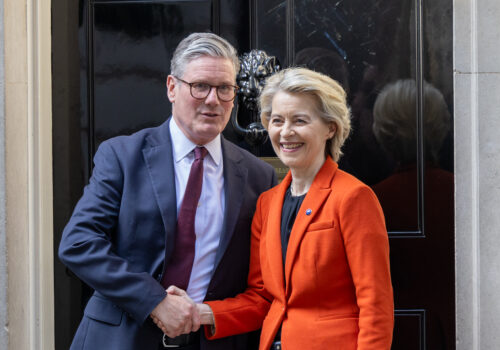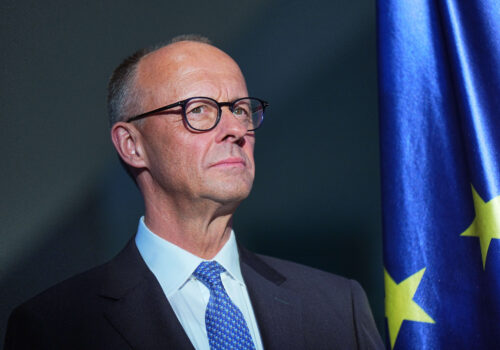Portugal’s shift to the right is accelerating. What does that mean for its future?
Portugal is going through a historic rightward shift. Initial results from Sunday’s election have the center-right Democratic Alliance (AD) winning, but without an absolute majority, the center-left Socialist Party (PS) falling hard, and the far-right Chega party continuing its meteoric rise.
This means that for the first time in Portuguese democratic history, there is not a “center majority” between the center-right and center-left. With new power balances in play, Portugal’s politics may get even messier—with political paralysis the new norm, preventing necessary reforms in key sectors such as housing, healthcare, and defense.
This was the third election in three years for Portuguese voters. Among European Union (EU) nations, only Bulgaria has had more elections than Portugal over the past seven years—and election fatigue was evident in this campaign. What Portuguese voters really want is stability, but these results might make that dream harder to come by in the months and years ahead.
Winners and losers
AD, a center-right coalition between the Social Democratic Party and the CDS-People’s Party, won the March 2024 legislative elections by the slimmest of margins, taking the reins of government from PS for the first time since 2015. That election also marked the surge of the far-right Chega party—“Enough” in Portuguese—with a strong third-place showing. Although this fractured political landscape made governing difficult for AD, led by Prime Minister Luís Montenegro, it was still able to pass a budget and begin implementing its program as a minority government.
The 2025 election campaign was nearly identical to the 2024 cycle, with the same eight principal parties/coalitions on the ballot—all led by their same respective leaders. The Portuguese housing crisis and migration topped the list of voter concerns, followed by healthcare, pensions, and salaries. The war in Ukraine, transatlantic relations, and defense investment were not actively discussed during the campaign and the debates.
Three parties secured the majority of the 230 parliamentary seats, and they will drive the Portuguese political system for the near future.
AD won the election, but it fell short of an absolute majority. With eighty-nine seats (up from eighty in 2024), the election reinforces Montenegro’s belief that the country is asking for stability and the opportunity to govern with the normal full four-year mandate. But even if AD partners with smaller parties, it still will not have a majority to govern outright. Thus, AD is hoping the president will once again ask the center-right to form a minority government.
The Socialist Party was the big loser on Sunday, securing only fifty-eight seats (down from seventy-eight) and losing more than 360,000 votes from 2024. This is an epic fall for a party that has been a staple of Portuguese politics since the transition to democracy in the 1970s. In the next government, PS—even if aligned with small left-wing parties—will not be able to outright block government initiatives, leaving the role of kingmaker to Chega.
The far-right party was the biggest winner, as Chega secured fifty-eight seats (up from fifty), gaining more than 230,000 votes from the 2024 contest. Depending on the distribution of the last four seats, which are reserved for the votes of Portuguese citizens living outside the country, Chega could find itself in second place. (The distribution of these seats will be known by May 28.) In 2024, Chega won two of the four “emigrant” seats, with the other two split between PS and AD. A similar outcome this year would put Chega in the runner-up position. The election results show that the issues most central to Chega’s program—illegal migration and corruption—continue to resonate with the Portuguese electorate.
Political pitfalls ahead
Although AD won the most votes, there is no guarantee that President Marcelo Rebelo de Sousa will immediately invite Montenegro and AD to form a government. That’s because the president is keen on stability, and he made it clear during the election that he wants any government he nominates to have its program accepted by Parliament.
In Portugal, the nominated prime minister has ten days to present its governance plan to Parliament. If no party or faction within the new Parliament votes to reject (or approve) the program, then the program passes automatically, and the nominated government inherits full executive authority. Should any party or faction reject the program, then it would go to a vote to the whole of Parliament.
In this case, an absolute majority would be needed to bring down the nominated government—forcing the president to nominate a different government configuration (as happened in 2015) or subject the country to another legislative election. But the Portuguese Constitution prohibits the legislature from being dissolved within the first six months of its mandate or during the final six months of a presidential term. Rebelo de Sousa will finish his second term in March 2026, with the next presidential election scheduled for January 2026. This means late spring 2026 could be the earliest opportunity for new elections. So if a nominated government is brought down, it would leave a long-term caretaker government—a situation the president wants to avoid. It is unlikely that Chega and the Socialists would join forces to block the installation of an AD minority government. Nonetheless, the president will do his due diligence behind the scenes before nominating Montenegro to be prime minister again.
Regardless of the composition of the new government, there is now an absolute majority on the right. Should AD and Chega find common ground on a particular issue—such as immigration—they will be able to enact policy without the left blocking proposals. With Chega possibly becoming the number two party in Parliament, it will be under more pressure to show it is more than just an anti-incumbent party and has the ability and gravitas to govern.
From Lisbon to Washington
It is still too early to see how any new Portuguese government will approach the current US administration, but it is unlikely that Portugal will change its approach of having the transatlantic relationship be one of the pillars of its foreign policy. Montenegro’s government was reserved and cautious on transatlantic relations during the early days of the new US administration. The prime minister refused to critique the United States for its stance on Gaza, while asking for “realism” and dialogue concerning tariffs. Yet, Montenegro allowed his defense minister to openly question US predictability as an ally when making public comments about the potential purchase of the US-built F-35 fighter jet.
Chega’s outsized role in the next Parliament, even if it does not become part of the government, may change this dynamic and push the executive toward reinforced ties with the United States. US President Donald Trump invited André Ventura, Chega’s leader, to attend the presidential inauguration in January, while Chega vowed to “privilege the transatlantic link” and prioritize its alliance with the United States as part of its 2025 election campaign foreign policy program. Montenegro has often critiqued Chega as unreliable, but he may have to adapt to the new reality of the Portuguese political landscape.
The NATO Summit looms on the horizon, and it is possible a new government begins its mandate only a week or two before the June 24-25 event in The Hague. Whoever represents Portugal as head of government will have the unenviable position of articulating a plan to increase defense investment, which is still well below the 2 percent of gross domestic product threshold set in the Alliance’s 2014 Wales pledge.
Defense spending is one area that the AD and Chega may find common ground. Chega proposed for Portugal to meet its 2 percent goal in 2026, three years earlier than AD’s 2029 goal, while PS did not quantify a target date in its electoral plan. It will take political will by Montenegro and AD to use this opportunity to move Portugal out of the shrinking list of NATO members still unable to fulfill the Wales pledge. This willpower has been historically absent in Portugal among all parties, a country benefiting from its geography and its distance from the Alliance’s eastern flank to under-prioritize defense spending while focusing on social programs.
With the composition and functioning of the new government in flux, Portugal could remain in an era of political paralysis for some time. How the future center-right government leads with a far-right primary opposition will determine if the country can break through its fractured political landscape and address the country’s challenges. Lisbon’s foreign policy could remain unsettled for some time given this reality. The big question remains whether the government will come together effectively enough to avoid yet another election in a year’s time.
Andrew Bernard is a nonresident senior fellow with the Atlantic Council’s Europe Center.
Further reading
Thu, May 15, 2025
Can the EU-UK summit lead to a new post-Brexit partnership?
New Atlanticist By Ed Owen
With shared challenges at home and abroad, the United Kingdom and European Union have an opportunity to renew their trade and security ties.
Mon, May 19, 2025
Experts react: What message did Romanians send by electing Nicusor Dan?
New Atlanticist By
The mathematician and mayor of Bucharest came out ahead of his right-wing rival on May 18. Atlantic Council experts sum up the election results and the implications.
Tue, May 6, 2025
Is Merz’s double-take chancellor vote a sign of things to come in Germany?
New Atlanticist By
It took two rounds of voting in the Bundestag to elect Friedrich Merz chancellor, a sign of division unprecedented in modern German history.
Image: Supporters gather at a rally held by Andre Ventura, leader of Portugal's far-right political party Chega, on the final day of campaigning, ahead of Portugal's general election, in Lisbon, Portugal, May 16, 2025. REUTERS/Rodrigo Antunes



